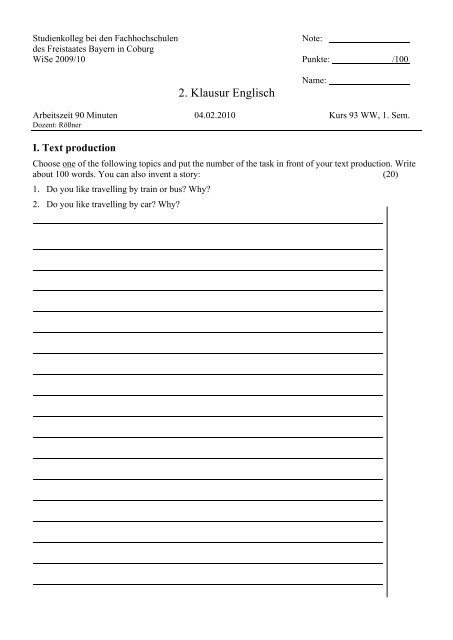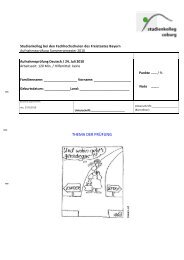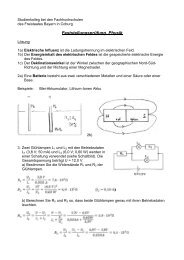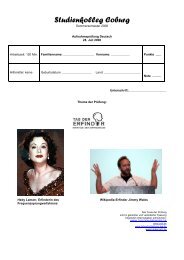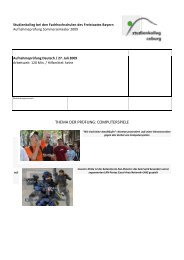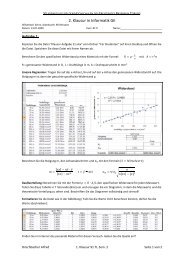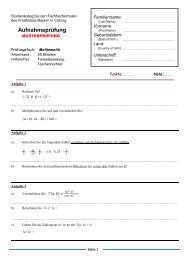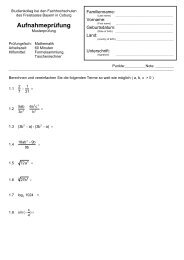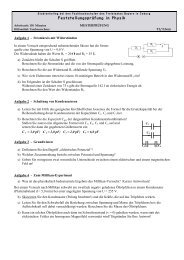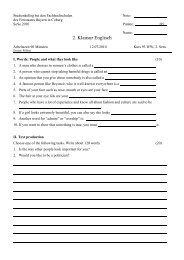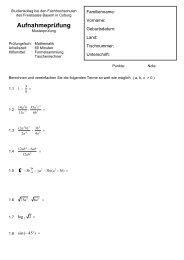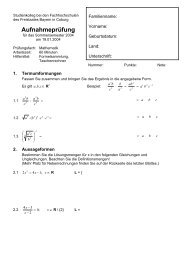2. Klausur Englisch - Sk-coburg.de
2. Klausur Englisch - Sk-coburg.de
2. Klausur Englisch - Sk-coburg.de
You also want an ePaper? Increase the reach of your titles
YUMPU automatically turns print PDFs into web optimized ePapers that Google loves.
Studienkolleg bei <strong>de</strong>n Fachhochschulen Note:<br />
<strong>de</strong>s Freistaates Bayern in Coburg<br />
WiSe 2009/10 Punkte: /100<br />
<strong>2.</strong> <strong>Klausur</strong> <strong>Englisch</strong><br />
Name:<br />
Arbeitszeit 90 Minuten 04.0<strong>2.</strong>2010 Kurs 93 WW, 1. Sem.<br />
Dozent: Rößner<br />
I. Text production<br />
Choose one of the following topics and put the number of the task in front of your text production. Write<br />
about 100 words. You can also invent a story: (20)<br />
1. Do you like travelling by train or bus? Why?<br />
<strong>2.</strong> Do you like travelling by car? Why?
5<br />
10<br />
15<br />
<strong>Sk</strong> Coburg 93 WW <strong>2.</strong> <strong>Klausur</strong> <strong>Englisch</strong> am 04.0<strong>2.</strong>2010 Seite 2<br />
Talitha’s blog: Cars aren’t so cool anymore<br />
(A) For years one of the most important days in<br />
a US teen’s life has been the day they’ve got<br />
their first car. Many people here got their first<br />
car on their 17th birthday and spent their late<br />
teen years driving around with their friends. But<br />
economists say this could be changing. And<br />
that’s great news for everyone.<br />
(B) People in the US bought fewer cars last year<br />
than they had in any year since the 1940s. They<br />
have bought an average of 17 million cars every<br />
year since 2000. But last year they bought only<br />
10 million cars.<br />
(C) Experts say there could be many reasons for<br />
this, including the bad economy, the high cost of<br />
oil, concerns about the environment – and the<br />
changing opinions of teens. They say teens here<br />
Words:<br />
aren’t as excited about driving now as they were<br />
years ago. They prefer meeting people on socialnetworking<br />
sites to driving cars and use public<br />
20 transport instead of learning to drive.<br />
25<br />
30<br />
(D) I really hope this is true. There are now 246<br />
million cars in the US and 209 million drivers.<br />
So there are more cars than drivers. That’s just<br />
crazy! Here in Los Angeles the roads are full of<br />
big cars, usually with only one driver insi<strong>de</strong>.<br />
And these big cars emit dangerous gases that are<br />
really bad for the environment.<br />
(E) Unfortunately there isn't much public<br />
transport in Los Angeles so many people don't<br />
have a choice - they have to drive everywhere. I<br />
really hope teens can find a way to change the<br />
US so we can all live without cars in the future.<br />
Talitha’s blog on www.spoton.<strong>de</strong>, 18.01.2010<br />
• an economist: a person who studies the economies of a country or different countries<br />
• an average: If you add numbers and divi<strong>de</strong> them by the amount (Anzahl) of numbers you will get the<br />
average.<br />
• instead of: anstatt zu<br />
• to emit: send out gas into the air<br />
II. Multiple matching (12)<br />
Match the headlines below with a paragraph in the text. There is one headline which does not fit.<br />
1. What is there to chose?<br />
<strong>2.</strong> Driving for fun<br />
3. Too many cars<br />
4. Online chat more popular?<br />
5. I don’t want a car.<br />
6. Not so many cars anymore<br />
III. Answer the questions in whole sentences. (26)<br />
1. What’s been the most important event for a young US-American for a long time?<br />
<strong>2.</strong> When do young Americans usually get their first car?<br />
3. Economists say that this could be changing. What does Talitha (author of the text) think about that?<br />
4. Explain what the number “17 million” means in the text.<br />
5. What can be said about cars in the US last year?<br />
A<br />
B<br />
C<br />
D<br />
E<br />
doesn’t fit
<strong>Sk</strong> Coburg 93 WW <strong>2.</strong> <strong>Klausur</strong> <strong>Englisch</strong> am 04.0<strong>2.</strong>2010 Seite 3<br />
6. Why did the number in car sales drop? Write down three reasons.<br />
a)<br />
b)<br />
c)<br />
7. Why does Talitha say that there are too many cars? Answer in three short sentences.<br />
a)<br />
b)<br />
c)<br />
8. Why are these many cars so bad?<br />
9. What’s a big disadvantage in Los Angeles?<br />
IV. Samoans drive from right to left: Fill in the correct verb from the list in the correct tense. (10)<br />
allow – be – change – crash – die – do – drive - have – help – must<br />
It's something no country for around 40 years. On 7th September, drivers in<br />
Samoa si<strong>de</strong>s - from the right si<strong>de</strong> of the road to the left!<br />
This change may sound unusual, but it the small country in the South<br />
Pacific save money! It cheaper vehicles to be imported from Australia and<br />
Japan - where cars on the left too, and therefore<br />
the steering wheel on the right.<br />
However, many people think the i<strong>de</strong>a is crazy and totally confusing for drivers. "Cars ,<br />
people - not to talk about the huge cost to our country," says lawyer<br />
Tole'afoa Solomona Toa'iloa. Preparations for the move may cost the government $300 million, and bus<br />
owners buy new buses. After all, now their doors<br />
on the wrong si<strong>de</strong>!<br />
www.spoton.<strong>de</strong>, 09.09.2009, slightly adapted
<strong>Sk</strong> Coburg 93 WW <strong>2.</strong> <strong>Klausur</strong> <strong>Englisch</strong> am 04.0<strong>2.</strong>2010 Seite 4<br />
V. Horror in the city: Complete the text with the simple past or the past progressive. (16)<br />
It was a lovely morning. When I (leave) the house the sun<br />
(shine) and I (feel) happy. But the feeling didn't last long. When I<br />
(arrive) at the station, lots of people (wait) to buy a ticket.<br />
The man (close) his ticket window just as I got there. “Sorry. It's my tea<br />
break,” he said. The train (leave) when I (get) to<br />
the platform. The next train was packed. I (stand) all the way while some<br />
children (sit) comfortably. No one (offer) me a seat.<br />
Children are so impolite these days! A woman was standing next to me. She<br />
(read) her paper when a child (put) his hand in her bag. “Thief!” I shouted.<br />
“That boy is taking your purse!” But the boy was the woman's son. When I<br />
(go) away from the station it (rain). When I got to the office, I certainly<br />
(not smile) anymore.<br />
VI. Comparison of adjectives (12)<br />
Bil<strong>de</strong>n Sie Sätze nach <strong>de</strong>m folgen<strong>de</strong>n Muster: A ist größer als B, aber nicht so groß wie C.<br />
1. texting / phoning / drinking – dangerous<br />
While driving,<br />
<strong>2.</strong> Julia / Pamela / Penelope – pretty<br />
3. German winters / English winters / Russian winters – bad<br />
VII. Quantifiers and pronouns. Fill in the correct word. (14)<br />
V = Vicky, S = Sarah<br />
V Do we need else?<br />
S Let’s have a look. We've got apples, but there aren't grapes.<br />
And there isn't coffee, but we've got tea.<br />
V Is there orange juice left, or did somebody finish it?<br />
S There is , but there isn't , so we need more.<br />
V And vegetables? Have we got vegetables?<br />
S Well, I can see carrots, but there aren't onions.<br />
V Oh, and don't forget we need crisps. My nephews are coming tomorrow!<br />
S Right, then. I think that's everything. Let’s go! By the way, how money<br />
have you got?
<strong>Sk</strong> Coburg 93 WW <strong>2.</strong> <strong>Klausur</strong> <strong>Englisch</strong> am 04.0<strong>2.</strong>2010 Seite 5<br />
Musterlösung<br />
II. Multiple matching (12)<br />
Match the headlines below with a paragraph in the text. There is one headline which does not fit.<br />
1. What is there to chose?<br />
<strong>2.</strong> Driving for fun<br />
3. Too many cars<br />
4. Online chat more popular?<br />
5. I don’t want a car.<br />
6. Not so many cars anymore<br />
III. Answer the questions in whole sentences. (26)<br />
1. What’s been the most important event for a young US-American for a long time?<br />
The day when they’ve got their car.<br />
<strong>2.</strong> When do young Americans usually get their first car? They get their car when they are seventeen.<br />
3. Economists say that this could be changing. What does Talitha (author of the text) think about that?<br />
She thinks this would be great.<br />
4. Explain what the number “17 million” means in the text. US citizens have bought 17 million<br />
cars every year since year 2000.<br />
5. What can be said about cars in the US last year? People bought only 10 million cars.<br />
6. Why did the number in car sales drop? Write down three reasons.<br />
a) Because the high cost of oil / Bad economy,<br />
b) worries about the environment,<br />
c) and because teenagers have changed their opinions.<br />
7. Why does Talitha say that there are too many cars? Answer with three short sentences.<br />
a) There are more cars in the US than drivers.<br />
b) In LA the roads are full with cars.<br />
c) Drivers of big cars often travel alone.<br />
8. Why are so many cars bad? Cars emit gases that are bad for the environment.<br />
9. What’s a big disadvantage in Los Angeles? There isn’t enough public transport, so people have to<br />
use their cars.<br />
IV. Samoans drive from right to left: Fill in the correct verb from the list. (10)<br />
allow – be – change – crash – die – do – drive - have – help – must<br />
A 2<br />
B 6<br />
C 4<br />
D 3<br />
E 1<br />
doesn’t fit 5<br />
It's something no country has done for around 40 years. On 7th September, drivers in Samoa changed<br />
si<strong>de</strong>s - from the right si<strong>de</strong> of the road to the left!<br />
This change may sound unusual, but it helps the small country in the South Pacific save money! It will<br />
allow cheaper vehicles to be imported from Australia and Japan - where cars drive on the left too, and<br />
therefore have the steering wheel on the right.<br />
However, many people think the i<strong>de</strong>a is crazy and totally confusing for drivers. "Cars are going to crash,<br />
people are going to die - not to talk about the huge cost to our country," says lawyer Tole'afoa Solomona<br />
Toa'iloa. Preparations for the move may cost the government $300 million, and bus owners must buy new<br />
buses. After all, now their doors are on the wrong si<strong>de</strong>!<br />
www.spoton.<strong>de</strong>, 09.09.2009, slightly adapted
<strong>Sk</strong> Coburg 93 WW <strong>2.</strong> <strong>Klausur</strong> <strong>Englisch</strong> am 04.0<strong>2.</strong>2010 Seite 6<br />
V. Horror in the city: Complete the text with the simple past or the past progressive. (16)<br />
It was a lovely morning. When I left (leave) the house the sun was shining<br />
(shine) and I was feeling (feel) happy. But the feeling didn't last long. When I<br />
arrived (arrive) at the station, lots of people were waiting (wait) to buy a<br />
ticket. The man was closing (close) his ticket window just as I got there. “Sorry. It's my<br />
tea break,” he said. The train was leaving when I got (get) to the platform. The next<br />
train was packed. I was standing/stood (stand) all the way while some children<br />
were sitting/sat (sit) comfortably. No one offered (offer) me a seat. Children are so<br />
impolite these days! A woman was standing next to me. She was reading (read) her paper when a<br />
child put his hand in her bag. “Thief!” I shouted. “That boy is taking your purse!” But the boy was<br />
the woman's son. When I went (go) away from the station it was raining<br />
(rain). When I got to the office, I certainly wasn’t smiling / didn’t smile (not smile) anymore.<br />
VI. Comparison of adjectives (12)<br />
Bil<strong>de</strong>n Sie Sätze nach <strong>de</strong>m folgen<strong>de</strong>n Muster: A ist größer als B, aber nicht so groß wie C.<br />
1. texting / phoning / drinking – dangerous<br />
While driving, texting is more dangerous than phoning but not as dangerous as drinking.<br />
<strong>2.</strong> Julia / Pamela / Penelope – pretty<br />
Julia is prettier than Pamela, but not as pretty as Penelope.<br />
3. German winters / English winters / Russian winters – bad<br />
German winters are worse than English winters, but not as bad as Russian winters.<br />
VII. Quantifiers and pronouns. Fill in the correct word. (14)<br />
V = Vicky, S = Sarah<br />
V Do we need anything else?<br />
S Let’s have a look. We've got some apples, but there aren't any grapes. And there isn't any coffee,<br />
but we've got some tea.<br />
V Is there any orange juice left, or did somebody finish it?<br />
S There is a little/some, but there isn't much, so we need some more.<br />
V And vegetables? Have we got many/any vegetables?<br />
S Well, I can see a few/some carrots, but there aren't many/any onions.<br />
V Oh, and don't forget we need a lot of/some crisps. My nephews are coming tomorrow!<br />
S Right, then. I think that's everything. Let’s go! By the way, how much money have you got?


